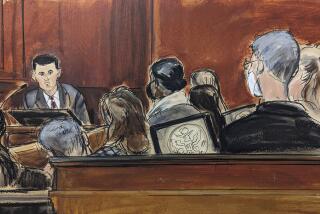Baxter ‘Heartbroken’ by Events, Skilling Testifies
- Share via
WASHINGTON — With Enron Corp. insiders facing angry accusations from members of Congress and others for apparently walking away with millions while ordinary workers lost their life savings, it’s not easy to evoke sympathy for a senior executive.
But there was a moment Thursday when that happened--during a daylong hearing before the House Energy and Commerce subcommittee on oversight and investigations.
It occurred during a bruising question-and-answer session when former Enron Chief Executive Jeffrey K. Skilling was asked to describe a conversation with J. Clifford Baxter, the former Enron vice chairman who reportedly objected to some of the accounting maneuvers that ultimately pushed the company into bankruptcy.
Baxter, whom Skilling had described as a close friend, shot himself to death Jan. 25. An autopsy report released this week said that Baxter, who left Enron in May, had taken a pain reliever, an antidepressant and a sleeping aid before shooting himself in the right temple.
As Skilling began to answer the question about Baxter’s concerns, he seemed to lose the composure that otherwise characterized his several hours of testimony. He hesitated, and his voice cracked with emotion.
“I don’t think there is anyone who knew Cliff and spent time with Cliff toward the end that didn’t realize--and I don’t think this is betraying any confidence with the family--that didn’t realize he was heartbroken by what had happened,” he told the committee.
“He believed that his reputation, my reputation, the reputation of the board of directors . . . were ruined by what had happened to the company--and the treatment of what had happened to the company by the press.”
Baxter, 43, spent a decade at Enron during the years it grew from a middling operator of natural gas pipelines into the seventh-largest U.S. company. Baxter zoomed up through the company behind Skilling, who resigned as Enron’s CEO in August for unexplained personal reasons.
A former Air Force captain, Baxter cashed out $28 million in stock gains from the sale of nearly 800,000 Enron shares from 1998 to early 2001, according to Thomson Financial/Lancer Analytics.
“He believed, as I believe, that we had created a great company . . . and to have a lifetime of work denigrated as it was in the press was very painful,” Skilling testified.
Skilling paused and addressed an aside to Baxter’s wife. “Carol, if you’re out there, I hope you’re OK with this,” he continued.
He said that Baxter came over to his house about a week before he died. The two men spent almost three hours talking, and Baxter expressed deep concerns about his reputation since Enron’s collapse.
More to Read
Inside the business of entertainment
The Wide Shot brings you news, analysis and insights on everything from streaming wars to production — and what it all means for the future.
You may occasionally receive promotional content from the Los Angeles Times.











